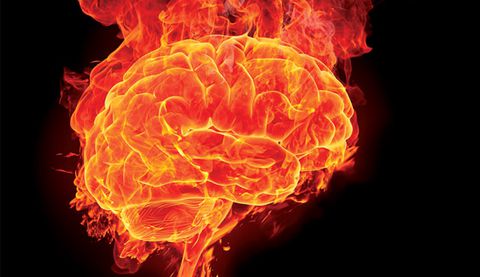Brain on Fire: The Link Between Inflammation and Depression


Written and verified by the psychologist Valeria Sabater
Brain on fire is a theory that proposes a relationship between inflammation and depression. Numerous studies show that many people diagnosed with depression have elevated levels of proinflammatory cytokines, which affect brain function and mood.
The authors of one of these studies, Charles L. Raison, Lucile Capuron, and Andrew H. Miller, published their work in Cell magazine in 2006. However, it’s important to note that this hypothesis has been around for several decades. In fact, it’s directly related to another hypothesis called the malaise theory of depression.
Dr. Bruce Charlton of the University of Buckingham has spent a significant amount of time trying to prove his theory with research and analysis. In a study he published in the year 2000, he tried to define the same concept.
Some people believe that depression could be linked to lifestyle, diet, or even environmental pollution. Other experts believe it’s a physical response to environmental stressors or worries.
According to the brain on fire theory, there is a physiological response to a supposed threat. That’s where the inflammatory and immune system response comes from. In this case, it acts like your worst enemy and weakens you instead of protecting you.
According to the brain on fire theory, when the brain perceives a stressor, it releases cortisol. This hormone triggers the production of cytokines, vasoactive amines, nitric oxide, and glucocorticoids.

What is the brain on fire theory based on?
These two hypotheses that relate depression to inflammation have pretty memorable names. On one hand, you have the malaise theory of depression. On the other, you have the brain on fire theory. Despite their different names, both theories have a lot in common.
The reason why scientists started to believe there was a connection between immune response and depression is the increasing number of people who weren’t responding to psychological treatment and drug therapy. What could be going wrong? Starting in the year 2000, the word “inflammation” gained popularity among some neurologists and psychiatrists.
Let’s take a closer look at the brain on fire theory and concepts.
Mechanisms that explain the link between inflammation and depression
When your body detects the presence of a virus, it triggers an immune response with the goal of fighting the enemy. The immune response is inflammation.
The brain on fire theory states that our bodies trigger this same immune response when we experience pressure, stress, fear, or anxiety.

- Thus, when your body is fighting off an internal pathogen, it uses white blood cells and other strong chemicals like cytokines. Cytokines are a type of protein capable of coordinating the immune response.
- Just as we said at the beginning, scientists are noticing that many people with depression have a higher than normal level of proinflammatory cytokines.
- A Janssen Research and Development study analyzed 14,275 patients with depression. One of the researchers noticed that 60% of these patients had a very high level of C-reactive protein (RCP), a marker for inflammatory illness.
- Cytokines can stay in the bloodstream for months. That can cause neuroinflammation. Over time, it can also cause physical pain and a weakened immune system.
How can you fight inflammation-triggered depression?
First of all, we have to clarify something important. Not all depression is created equal, and not all depression is caused by inflammation. The brain on fire theory comes into play for individuals who have tried psychological therapy and medication and have seen no improvement.
Scientists and the pharmaceutical industry have a challenge ahead of them. They have to design new drugs for these kinds of conditions. In the meantime, however, the following strategies have proven to be very effective:
- Stress-reduction exercises.
- Breathing and relaxation techniques.
- Physical exercise.
- Anti-inflammatory diet (eating less sugar, salt, white flour, processed foods, and saturated fats and avoiding alcohol and tobacco).
- Omega-3 and vitamin D nutritional supplements.

In conclusion, many experts believe that chronic stress triggers depression. If we were better prepared and better equipped to manage these issues, we could avoid inflammation and an immune system imbalance.
Don’t think twice about asking for professional and specialized help for your problems. You can heal and live a full and happy life.
All cited sources were thoroughly reviewed by our team to ensure their quality, reliability, currency, and validity. The bibliography of this article was considered reliable and of academic or scientific accuracy.
- Raison, C. L., Capuron, L., & Miller, A. H. (2006, January). Cytokines sing the blues: Inflammation and the pathogenesis of depression. Trends in Immunology. https://doi.org/10.1016/j.it.2005.11.006
- Slavich, G. M., & Irwin, M. R. (2014). From stress to inflammation and major depressive disorder: A social signal transduction theory of depression. Psychological Bulletin, 140(3), 774–815. https://doi.org/10.1037/a0035302
This text is provided for informational purposes only and does not replace consultation with a professional. If in doubt, consult your specialist.








